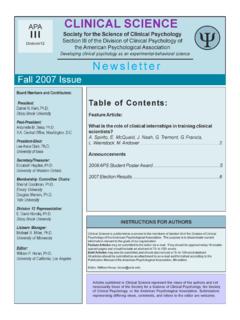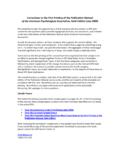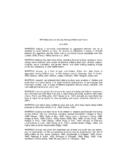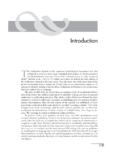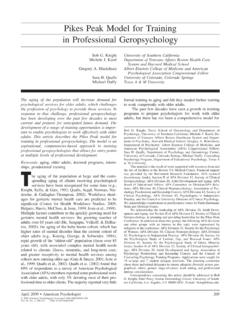Transcription of APA Clinical Science Ψ III - sscpweb.org
1 APAIIID ivision12 SSCP Executive BoardPresident:Steven D. Hollon, UniversityPast-President:Mitch Prinstein, of North Carolina at Cha-pel HillPresident-Elect:Scott Lilienfeld, UniversitySecretary/Treasurer:Kate McLaughlin, University of WashingtonDivision 12 Representative:David Smith, of Notre DameStudent Representatives:Andrea NilesUniversity of California, Los AngelesJessica HamiltonTemple University At Large Members:Douglas Mennin, CollegeLeonard Simms, at BuffaloClinical Science Editor:Autumn Kujawa, State College of MedicineClinical ScienceSociety for the Science of Clinical PsychologySection III of the Division of Clinical Psychology of the American Psychological AssociationNewsletterDeveloping Clinical psychology as an experimental-behavioral scienceArticles published in Clinical Science represent the views of the authors and not necessarily those of the Society for a Science of Clinical Psychology, the Society of Clinical Psychology, or the American Psychological Association.
2 Submissions representing differing views, comments, and letters to the editor are welcome. Fall 2016: Volume 19, Issue 3 Table of ContentsPresidential ColumnExorcising the Demons that Plague Continuing Education (CE)S. on Quality CEA. Minniti, APA Office of CE Sponsor Diversity CornerHampton, Mekawi, and & Science Early Career Path J. PerspectiveS. PerspectiveN. from Student Representatives A. Niles & J. Earlier this summer an opinion piece appeared in the Washington Post by Richard Gallagher, , a board-certified psychiatrist at New York Medical College, who described his growing involvement with and belief in exorcisms as a means of ridding those afflicted with what appeared to be mental disorders of the demons that are causing their symptoms . That all seemed rather curious coming from a trained physician and it led members of the Society for a Science of Clinical Psychology (SSCP) to look to see if training in exor-cisms was offered by a Continuing Education (CE) provider sanctioned by the American Psychological Association (APA).
3 Such a program was found to exist and this led to considerable consternation among the membership, leading to renewed calls for SSCP to cut its ties with it turned out, that program was not offered for CE credits to psychologists, but it did lead us to ask for a meeting with the staff at APA that oversaw the CE pro-cess. We had been engaged for some time in working with APA staff to ensure that programs that get offered for CE credit are based on Science (when not purely focused on ethics) and had played some role in the re-cent revision in the Standards and Criteria for Approval of Sponsors of Continuing Education for Psycholo-gists ( ). Our sense was that the APA staff is amenable to change and shares many of the same values as the membership of SSCP. Nonethe-less, several other problematic programs came to light in the discussion kicked off by furor over exorcism that suggested that the recent reforms might not be having their intended effect, so we asked for a meeting with the staff at the 2016 APA convention in and future presidents Mitch Prinstein and Scott Lilienfeld and I met with two representatives of APA, Drs.
4 Antoinette Minniti, who oversees the Office of CE Sponsor Approval (CESA), and Cynthia Belar, the current CEO of APA. What we found is that Drs. Min-niti and Belar shared many of our concerns and were as committed as we were to maintaining the scientific integrity of the programs that were being offered to psychologists for CE major source of the problem is that APA does not review specific programs (at least before the fact). Rather, it approves sponsors who propose multiple pro-grams in any given year not all intended for psycholo-gists. Some egregious courses could well slip through including some for which CE credits could be earned. How often that actually occurs is not absolutely clear, but it does sometimes happen. It also is not clear that the person-power exists under the current system to screen at the level of the specific program. Dr. Minniti has a staff of three non-doctoral people working under her to screen applications from hundreds of potential sponsors in any given year (she currently has over 800 approved sponsors), some of whom provide over 1000 programs a year.
5 Those proposals that pass that first review go on to a 14-person Continuing Education Committee (CEC) comprised of APA members who volunteer to spend their time reviewing the applica-tions. The workload is immense and the person-power apportioned to the task could increase its resources by raising its fees. That is something that is up to the CEC. The downside is that any increase in fees might be passed on to the consumer (psychologists seeking CE credits) but that is something that can be done. Whether that is neces-sary or desirable depends in part on just how many egregious programs do get through and whether there is a way to work the process already in place that can effectively weed them Minniti reminded us that there is a formal complaint process and asked the members of SSCP to help the process along by calling attention to any particularly egregious examples of programs that should not re-ceive CE credits from APA.
6 Should an individual wish to submit a complaint about a sponsor organization or particular offering, they can do so through the APA s CESA Complaint Process at This can be done by anyone, whether a member of SSCP or not, but given that our members are likely to have particular concerns about the scientific integrity of the offerings, Dr. Minniti wanted to be sure that they were aware of the process for filing complaints and that they knew that those complaints would be taken seriously. In effect, she was asking for our help in policing the scientific integrity of the programs. It is as if she were inviting us to become Ghostbusters . She did ask that we do our homework when we file a complaint and indicate the title of the program in ques-tion so that CESA could figure out whether it was be-ing offered to psychologists for credit (a given sponsor might provide continuing education to a lot of different professions so the program in question might not be one that psychologists can take for credit).
7 That be-ing said, one might become suspicious of the overall quality of what a sponsor offers if many of its programs are particularly egregious. Dr. Minniti asked that our members first contact the sponsor to see if they would rectify the problem before filing the formal complaint but indicated that each complaint (once filed) would be followed up. Filing multiple complaints about the same Presidential ColumnExercising the Demons that Plague Continuing EducationSteve D. Hollon, , Vanderbilt UniversityClinical Science Vol. 19 (3): Fall 2016 2 program is unnecessary and will only clog the system (since each has to be processed) but having multiple signees to a complaint is a perfectly reasonable way to express breadth of support. In essence, CESA is asking for our input and our membership has been deputized .Filing a complaint will not necessarily lead to a program or a sponsor losing approval. There are guidelines that APA must follow before it can withdraw approval or risk opening itself up to legal repercussions.
8 Conver-sion therapy for sexual orientation is the only type of therapy that the APA has formally ruled out and there are many other types of treatments with little evidence of efficacy or questionable scientific rationales. How the CEC will interpret those guidelines in any given instance is unclear but best resolved by filing a complaint. The guidelines can be found at: Dr. Minniti has provided an overview of the way in which the CE process is handled at APA in an accompanying the aftermath of that meeting at the APA conven-tion I sent a message out on the SSCP listserv asking members to let me know if they knew of egregious CE offerings and encouraging them to file complaints if they did. I expected to be inundated and was surprised at how few responses I received. That may mean that the problem is not that big or just that most folks are away in August. Jerry Davison (himself a former CEC member) indicated that he filed a complaint about an offering on energy tapping therapy that Jerry Rosen had attended; the CEC determined that the program was not in compliance with the Standards and Criteria and instructed the sponsor (PESI, Inc.)
9 To stop offering that program for CE credit to psychologists. Score one for the integrity of the existing system. Richard Gist reported coming across a program on critical incident debriefing offered by the International Critical Incident Stress Foundation, Inc. (ICISF) and Jason Washburn has communicated directly with the sponsor involved. No complaint has yet been filed but I will be curious what the sponsor has to say (and what the CEC does if a formal complain is filed). I am struck by the sense of futility that I have seen in some of the interchanges on the SSCP listserv given that I have seen few concrete examples and none that have not been could of course be wrong and there may be numerous examples of egregious offerings out there that promise more than they can deliver and (as a consequence) defraud the psychologists that sign up for the training and ultimately defraud the public. It would not surprise me if that were the case.
10 One recent advert for expo-sure therapy described ..a simple 5-step protocol that quickly reconsolidates traumatic and implies that it is superior to ..medication, CBT, and exposure, and other traditional in treating trauma. If that were true I would sign up for the program my-self, but I am very skeptical that the ..board-certified who is providing the training can deliver on those claims even though my reading of the literature suggests that memory reconsolidation may underlie exposure. Complaints can be filed with respect to the basic offerings themselves or with respect to the claims that are made in the adverts designed to attract registrants for pay. The first responsibility of a profes-sion is to protect the public from bogus treatments and scurrilous claims of special efficacy. It will be interesting to see how the CEC responds to the complaints that it receives. Filing complaints about existing programs may be at best a stopgap solution, but it can be put into immediate effect.
